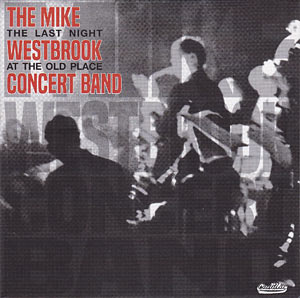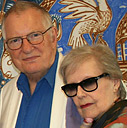Mike Westbrook
In 1996 Kate and I received a bundle of photo-copied sheet music from the composer/saxophonist Dirk Raulf. He was organising a concert in the Bundeskunsthalle, Bonn to mark the publication of Friedrich Hollaender’s autobiography. Now a rather neglected figure, Hollaender was known as one of the principal composer/songwriters of the Berlin Cabaret in the Weimar era. His first big hit, ‘Falling in Love Again’, was sung by Marlene Dietrich in the 1930 film ‘The Blue Angel’.
2019 Posts
Mike Westbrook
Viv Goodwin-Darke
28 Music of Hope
Mike Westbrook
Geoffrey Smith
July 2019
August 2019
October 2019
Mike Westbrook
31 Love Or Infatuation
Mike Westbrook
September 2019
30 Diana and Actæon
Kate Westbrook
32 Jazz Women Jazz
Kate Westbrook
33 At The Old Place
Mike Westbrook
Martin King
Francisco Macias
Chris Searle
November 2019
34 Li'l Darlin'
Mike Westbrook
Francisco Macias
December 2019
35 Carol for a Cool Midwinter
Mike Westbrook

Forced by Nazi persecution to flee the country in the mid 30s Hollaender, like his contemporary Kurt Weill, moved to the States. Unlike Weill who went on to great success on Broadway, Hollaender wound up as a jobbing composer in Hollywood. He wrote music for 150 movies, with songs for such stars as Betty Grable, Dorothy Lamour and Carole Lombard, as well as Dietrich.
Mostly escapist romantic comedies, these movies are long forgotten. Who now remembers ‘Desire’, ‘This Way Please’, ‘Cocoanut Grove’ and ’The Moon’s Our Home’? An exception is ‘Destry Rides Again’ from 1939 starring Dietrich and James Stewart (highly recommended!). These movie songs, usually sentimental ballads with lyrics by Hollywood hacks, were a far cry from Hollaender’s satirical and heavily political Berlin work. Along with the movies that had featured them, the songs sank into obscurity.
These were the songs that Dirk rescued from oblivion. Having come across them in his research, he sent them to us. Unpromising at first, closer inspection revealed a treasure-trove of tuneful, witty, touching songs, some of which rank with the best of Rogers and Hart and Cole Porter. Is there another love song in the American Song Book to touch ‘You Leave Me Breathless’?
We found that the verse/chorus structures of the songs, plus some unusual chord sequences offered possibilities for re-arrangement and improvisation. We broke the songs down to their constituent parts and re-assembled them into a musically integrated structure. We carved up the lyrics and wove them into a libretto. Together they tell an exuberant, humorous and tender story of Romantic Love. There is Brechtian ambiguity too (though Brecht despised Hollywood) which Kate underlined by asking Tommy Bodmer to translate the song ‘Love Or Infatuation’ into German. Imagine Pirate Jenny in Hollywood.
At the Bonn concert Kate joined an array of German ‘Divas’, each of whom did a 15-minute spot. The Divas included the music theatre star Ute Lemper, a cabaret artist Angelika Thomas, Dagmar Krause (who we knew from Henry Cow days) and Gizela May (‘Red Gizela’) one of the original artists of the Berlin Cabaret whose delivery of Hollaender’s beer-hall lieder had the ring of authenticity.
By then we were hooked on Hollaender. We added more songs and extended the piece into a full-length jazz cabaret ‘Love Or Infatuation’. We toured it at various European festivals and venues, and in 1997 recorded an album for ASC Records.
We’ve returned to the piece from time to time, latterly with the addition of saxophone and double bass. It still feels relevant. It seems important that these songs should be heard and, thanks to Dirk Raulf we are possibly the only people performing them. The show is still about “Falling in Love Again”, but raises questions, not only about the nature of Love, but also about the nature of jazz and the potency of ‘cheap music’. Is it real? Is it fake? Is it Art or merely entertainment? Is it Entertainment or merely Art? Is it Love, or is it Infatuation?
Mike Westbrook
Kate Westbrook, Mike Westbrook, Roz Harding ( sax) and Marcus Vergette (bass) perform “Love Or Infatuation” at the Globe, Chagford, Devon, Sunday October 6th.
Two Friedrich Hollaender songs are included in the Westbrook Duo’s album “Allsorts”.
The album "Love Or Infatuation" is available as a download from Bandcamp.
Kate Westbrook
With a background in Fine Art and Performance, I joined the Mike Westbrook Brass Band in 1974 as vocalist doubling tenor horn and piccolo. The first Jazz trip I made out of the UK was to the Old Jazz Days in Warsaw. Basically this was a ‘trad’ festival. But since our band played all kinds of music in street or concert hall, including Jelly Roll Morton and ‘High Society’, we just squeaked in. It was cold mid-winter and the Soviet regime was in evidence and oppressive. In the Palace of Culture and Science (the building an unwelcome gift from Moscow), there were bands from across Europe and further afield, and crowds of jazz lovers. There was one other woman playing on the festival, the larger than life vocalist and washboard player, Beryl Bryden.
Subsequently I have travelled and recorded with several composer/band leaders. Mostly I have worked as vocalist/librettist in ensembles led by Mike. We had success particularly in Europe (perhaps more than in the UK) and in Australia, North America and the Far East. The final decades of the last century and the early part of this, were a great time for work. Until recently we toured regularly in the Spring and in the Autumn and always did a few big jazz festivals. It struck me at festivals how few women were involved (I was often the only one) and how rare it was to come across a band run by a woman who wasn’t a vocalist. There were exceptions of course, including Barbara Thompson, Carla Bley, Lindsay Cooper and the Feminist Improvising Group, but predominantly this was a male preserve.
In 1985 my piece Revenge Suite was performed by a band that included former Henry Cow musicians cellist Georgie Born and bassoonist Lindsay Cooper. For Cuff Clout in the early 90s I commissioned work by eight composers from the worlds of jazz, pop and contemporary classical music, half of them women. My band at that time, The Skirmishers, consisted mostly of women musicians. In a Duo with accordionist Karen Street we made the album The Nijinska Chamber. My current band is The Granite Band in which saxophonist Roz Harding and bassist Billie Bottle feature. On Festivals now there are increasing numbers of women musicians, and ethnic and gender diversity is evident. Ian Roberts and the Teignmouth Festival are creating a Festival with a high proportion of women band leaders and participants, and this is welcome indeed.
So things are evolving for the better. However, not long ago Mike and I took workshops with students at the Lucerne Jazz Academy, and we did performances with them in Lucerne and Zurich. The mongrel band was brilliant. Leading me to ask what opportunities are there for the multitude of marvellous musicians just starting out, to pursue a life in music? Now we need to continue the fight not just for women but for all folks, and put Jazz and the Arts at the heart of our culture.
Kate Westbrook
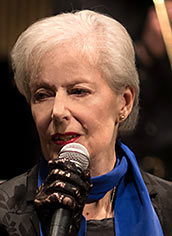
Kate Westbrook
photo: Alessandro Eusebi
Kate Westbrook and The Granite Band play Teignmouth Jazz and Blues Festival
on Sunday 20th October ( see diary for details)
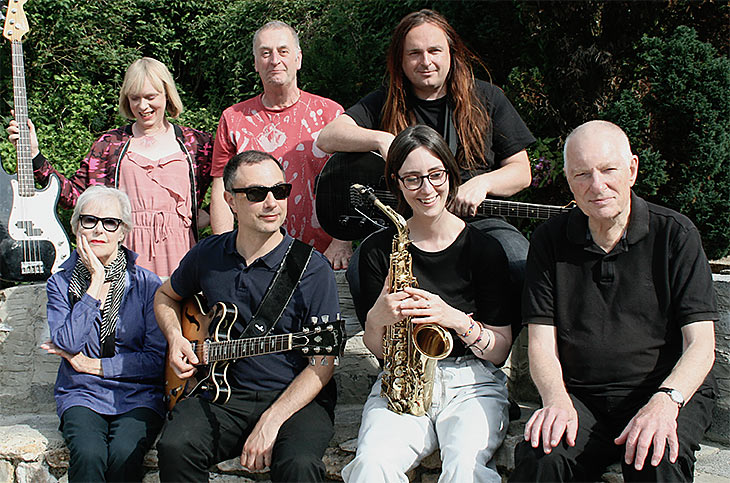
The Granite Band
Billie Bottle Coach York Matthew North
Kate Westbrook Jesse Molins Roz Harding Mike Westbrook
GRANITE the album is available on Westbrook Records
Mike Westbrook
On Thursday October 24th a commemorative blue plaque will be unveiled at 39 Gerrard Street, Soho, site of the first Ronnie Scott’s Club, which opened in 1959 and closed in 1968. Mike Westbrook writes:
On the night of Sonny Rollins’ debut in Gerrard Street the club held its breath. In the expectant hush the rhythm section waited on stage, not knowing what to expect. The massive figure of Rollins, his height emphasised by an enormous stetson, emerged playing from the back room, tenor saxophone held high. The Trio snapped into action. Rollins played “Three Little Words” for an hour, then played all the way back to the dressing room, leaving us stunned.
Those not around at that period can hardly imagine the thrill of being for the first time in the same room as such artists, of experiencing in the flesh the sheer sound of Rollins, Dexter Gordon, Johnny Griffin, Roland Kirk and the other great musicians that Ronnie Scott and Pete King brought to the club. Until that moment union restrictions had made it virtually impossible to hear American musicians live. The effect was life-changing.
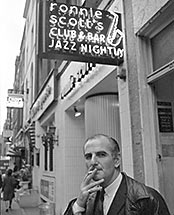
Ronnie Scott outside the Frith Street Club
I never actually got to work with Ronnie Scott. When he briefly re-formed his larger group, with some of younger players like Surman and Oxley, I was invited to contribute to the repertoire. I delivered two arrangements, one of which was rejected out of hand but one of which, “Too Late,Too Late” the band played and recorded. I was never paid but, though nothing was ever said, for years I was not charged admission to the club,- a fair enough arrangement. So after the club decamped to Frith Street I got to hear Ben Webster and Coleman Hawkins as well as much of the innovative music coming out of the States in the 60s and 70s. In those days visiting bands usually did a season of a week or two. I remember going night after night to hear Ornette Coleman’s Trio with David Izenson and Charles Moffatt. Then there was Charles Mingus, Archie Shepp, Stan Getz, Bill Evans, Cecil Taylor and the wonderful Betty Carter….
The move to Frith Street left 18 months still to run on the Gerrard Street premises. Ronnie and Pete decided to keep the old club open, and re-named it The Old Place, a venue for the newer British bands. It was an unparalleled act of generosity and commitment. Ronnie invited my band to do the Saturday All-Nighter. We played it almost every week until The Old Place eventually closed on May 25th 1968. The sextet included John Surman and Mike Osborne (saxophones), Malcolm Griffiths (trombone), Harry Miller (bass) and Alan Jackson (drums).
Typically the first part of the evening would be split with Bob Stuckey’s organ trio with Dudu Pukwana. After midnight we were on our own and could stretch out. Such creative freedom tested everyone to the limit, not least the audience. Numbers thinned as the night wore on, but there was always a hard core still around when manager and host John Jack cooked up bacon and eggs at 7am.
For me as a composer having a ready platform to present new work was a great opportunity. Having previously had to abandon an eleven-piece line-up, now I turned again to a larger format with “Celebration”, whose first London performance was at The Old Place. I was very drawn to the ‘free’ players that I was meeting at the nearby Little Theatre club, run by John Stevens, where we were also resident for a while. I formed what I called ‘The Other Band’ which for a while played Thursdays at The Old Place. The horns consisted of Dave Holdsworth, Paul Rutherford, Bernie Living and Nisar Ahmad ‘George’ Khan. These were among the musicians that I assembled for “Marching Song” in a series of after-hours rehearsals in the club.
After the public had gone home, John Jack would re-open the Old Place for musicians. This is where Chris McGregor first put together The Brotherhood of Breath. Meanwhile I was working on “Release”, a piece that brought together the Sextet and The Other Band, an explosive combination of strong individual musical personalities with contrasting styles and attitudes. The band eventually fell apart and we all moved on to other things. In its heyday it was incomparable.
This is the band that played the last night at the Old Place. Following the club’s closure the London scene became fragmented. Much of the collective spirit that had united musicians of different backgrounds and persuasions was lost. I think everyone sensed that this was the end of an era. The Age of Innocence was over. The queues to get in to The Old Place stretched all the way to Shaftesbury Avenue that night.
A commemorative blue plaque at 39 Gerrard Street in the heart of what became London’s Chinatown, is a permanent tribute to Ronnie Scott and Pete King, whose vision it was to create a jazz club in London to match those they had seen in New York. For me the plaque is a reminder of the countless hours spent in that basement, first as a listener then, when it became The Old Place, as a performer.
I remember the stable mates with whom I had the privilege of sharing that small stage and mourn all those we’ve lost, including, from The Concert Band, Mike Osborne, Paul Rutherford and Harry Miller. And John Jack who held everything and everyone together.
The ramifications of the music of the Old Place generation continue to spread far and wide. It’s good to be reminded of where it all started.
Mike Westbrook
“The Last Night At The Old Place” (Cadillac) is available on Westbrook Records.
Mike Westbrook and The Uncommon Orchestra are due to perform “On Duke’s Birthday” on April 29th 2020, Duke Ellington’s birthday, at Ronnie Scotts.
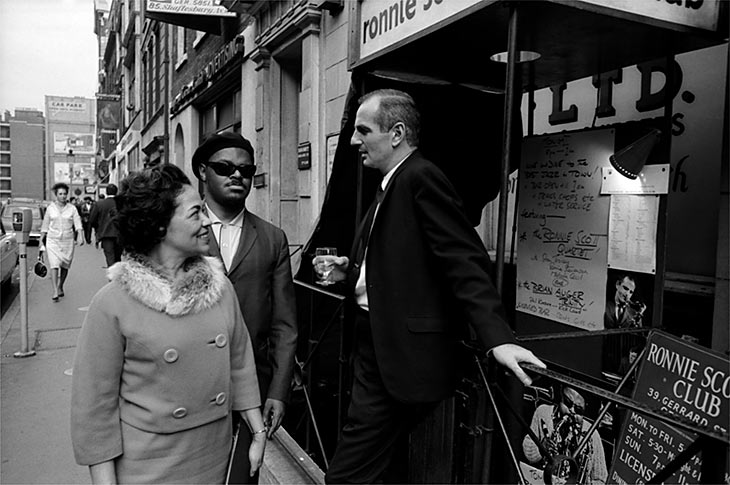
Ronnie Scott with Roland & Edith Kirk outside 39, Gerrard Street. (1963)
For Ever and a Day - The Mike Westbrook Concert Band, featuring Mike Osborne
